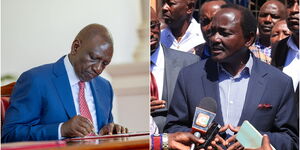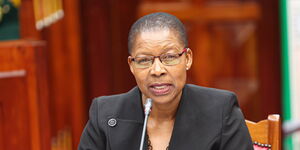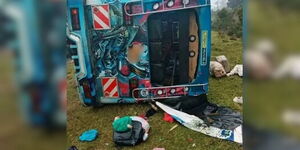The Senate has scheduled a special sitting on Wednesday, August 14, to address the impeachment of Meru Governor Kawira Mwangaza, marking the third time the embattled governor faces removal from office.
This session is poised to ignite fresh debates as murmurs grow louder about the possibility of dissolving the entire county government, which could force Meru residents back to the polls.
Governor Mwangaza’s political survival has been on the line multiple times, with the Senate previously saving her from ouster on two occasions. However, the stakes are higher now, as the county assembly's persistence in pushing for her removal has intensified.
Last week, 49 Members of the County Assembly (MCAs) voted in favour of her impeachment, citing gross violations of the Constitution, misconduct, and abuse of office, charges she has consistently denied.
The impeachment motion was introduced by Deputy Majority Leader Zipporah Kinya, who listed three primary allegations against the governor. Despite her determined efforts, 17 MCAs opposed the motion, and three abstained from voting, reflecting the deep divisions within the county’s political landscape.
Governor Mwangaza’s tenure has been marred by controversy, with this being the fifth attempt to remove her from office since she assumed the role. The county assembly’s relentless pursuit of her ouster raises questions about the underlying motivations, with some observers suggesting that political manoeuvring, rather than genuine legal grievances, is driving the impeachment efforts.
The Senate’s role in this unfolding drama is critical. Under Article 181 of the Constitution and Section 33 of the County Governments Act, the Senate is mandated to investigate the allegations against the governor. A special committee of eleven senators may be appointed to conduct the investigation, after which the Senate will vote on whether the charges have been substantiated.
If a majority of senators uphold the impeachment, Governor Mwangaza will be removed from office immediately. However, should the charges be dismissed, the Senate will notify the Meru County Assembly, effectively preserving Mwangaza’s position until the next inevitable confrontation.
The last time Governor Mwangaza faced impeachment, the Senate overwhelmingly rejected the charges against her, with senators crossing party lines to vote in her favour. Despite the serious nature of the accusations, including misappropriation of county resources, nepotism, and illegal appointments, the Senate found no evidence to support the claims.
Senate Speaker Amason Kingi, who presided over the previous impeachment proceedings, declared that none of the charges against Mwangaza were upheld, allowing her to continue serving as governor. This outcome, however, did little to quell the political tensions in Meru, as the MCAs have continued their campaign to oust her.
As the Senate prepares for the upcoming session, the political climate remains charged. Narok Senator Ledama Olekina has already voiced concerns over the process, suggesting that the ongoing conflict in Meru is more about political rivalry than genuine legal breaches. Speaking on a television programme, Olekina argued that impeachment cases in Kenya are often politically motivated, casting doubt on the impartiality of the proceedings.
The impending Senate session is likely to be a turning point for Governor Mwangaza. Whether she will once again evade removal or face the ultimate political consequence depends not only on the evidence presented but also on the broader political dynamics at play.












